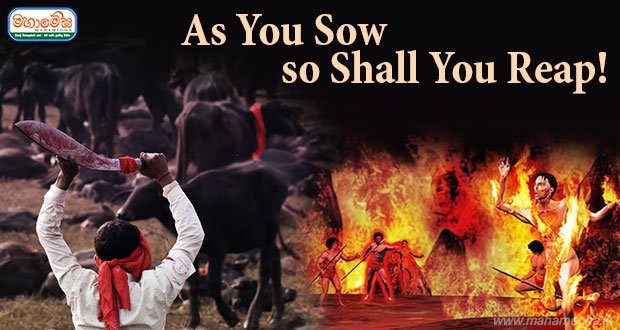The society that we live in is full of people of whom the behavior is sometimes wonderful as well as mystical. No matter how hard we try, most often than not, we fail to figure out the underlying factors that affect the behavior of people around us. But, the Buddha was able to understand causes for all types of complex human behaviors and emotions. Various discourses can be found in tipitaka on the same. Let us focus our attention on one such interesting and eye opening discourse of the Buddha that reveals the basis of the two extreme human emotions i.e. love and hate, called Pemadosa Sutta (discourse on faults of love), contained in the Anguttara Nikaya.
In this world, there are people whom we love and admire as well as people whom we hate. A person may love or hate the other throughout his or her life, while it may not be same with another. It is fascinating to see how certain people, who hated each other once, become best friends later and vice versa. The biologists today have found that the love and hatred, being the two most intense emotions, share the same brain circuits. Both the emotions can result in similar acts of extreme behaviors which may seem illogical and foolish to others. But, when a person’s emotionality supersedes rationality, his or her behavior also tends to be irrational. The Pemadosa Sutta reveals how the love can be a cause for love as well as hatred and how the hatred can be a cause for hatred as well as love.
Firstly, the Sutta explains how a person’s love towards the other would result in him or her loving another person (a third party). There may be a friend of ours or a person whom we love most. If someone admires and talks nice of such friend or person that we love, the result would be us being friends or loving such person. For example, if we love person A and person B talks nicely to person A. Then we will end up loving person B as well. In that way, the Buddha explains, love can result in love. Similarly, the love can also result in hatred. If someone, with or without any reason, criticizes and talks bad of someone that we love; it will end up in us hating and disliking such person. In the above example, if person B antagonizes and talks badly to person A, the result would be us starting to hate person B. Thus, the Pemadosa Sutta shows that, the love can result in both love and hatred.
Then, the Sutta reveals how hatred can result in love as well as in hatred. If a person talks badly to someone whom we hate, we tend to love that person. For example, if we hate person A and person B talks harsh words to person A; most likely we tend to like and love person B. Thus hatred can result in love. However, if a person talks nicely and kindly to someone that we hate, that would result in us hating such person. If person B talks nicely to person A (the one we hate), most likely we will hate and dislike person B. This explanation of general human behavior explains fundamental basis of our relationships and behavior in the society. It also explains the causes for various issues that we confront in our day-to-day lives at family level, village level, national level and globally.
The basis for inter-religion and intra-religion disagreements and disputes as well as people forming into various groups, which are common at present, can be easily understood with the above explanation provided in the Pemadosa Sutta. People tend to hate any person who criticizes their spiritual leaders (inter-religion). Even within a religion, people are grouped into various sects and traditions who hate each-other for criticizing their respective teachers. The four instances of relationship between love and hatred, explained above, can also be clearly observed in the field of politics. A simple example is how the politicians praise and admire a successful leader (loved by a majority of people) at the time of an election, with the view to obtain people’s preferences. Even at the workplace and village, the same nature of human behavior can be observed. Formation of informal groups at workplaces and the villages is mainly based on the shared values among members with respect to religion, politics, etc. and members of such groups do suffer from faults of love (Pemadosa) discussed above.
However, as disciples of the greatest teacher in the world – the Buddha, we are so much fortunate to have learned the Dhamma which provides solutions to all our day-to-day problems as well as the ultimate problem of ignorance (avijja). As per Dhamma, there is nothing in this world that is under our control. In general it is agreed that the nature including the sun, the moon, changes in nature such as weather, wind, aging, sickness and death are not controllable. Nevertheless, can a person control the behavior of people in a society, unless by using temporary powers like power of wealth or political power? Similarly, there is no way in which one can control the words uttered by someone else. Such words are like changes in nature, on which we have not control. So when someone criticizes a person’s loved one, he or she can perceive such criticism as an act of nature.
On the other hand, one will be a victim of faults of love (Pemadosa), only if he or she is attached to a particular teacher, person, political viewpoint, religious viewpoint or a material object. If someone blames such person or teacher that he or she loves and attached to, it is more likely for him or her to become a victim of faults of love discussed above. But, as per the teachings of our great teacher, we shall have no craving or aversion towards any person, any object or even any viewpoint. The Buddha has advised his disciples to take the Dhamma as one’s island (Dhammadipa), to take the Dhamma as one’s refuge (Dhammasarana), and to take no other refuge (Anannasarana). Thus, there is no way in which a real Buddhist can suffer from faults of love. However, one must have the patronage of noble friends (kalyanamitta) to learn the pure Dhamma which the Buddha has taught. Even if someone blames and criticizes one’s noble friend(s), one must be smart enough to match such criticism in line with Dhamma and not to change his or her state of mind.
To summarize, though it is comparatively a short discourse, the Pemadosa Sutta explains an important phenomena of the basis of generating love or hatred in humans. With such explanation, we can reason-out the changes in human behavior in the society around us. The sutta also shows us the importance of disciplining ourselves for not being victims of faults of love. Let us all have the good fortune of realizing Dhamma in this era of our noble teacher, the Gautama Buddha!
MAHAMEGHA 2013 Binara Issue
WWW.MAHAMEGHA.LK
By Mohan Senaratne














Recent Comments